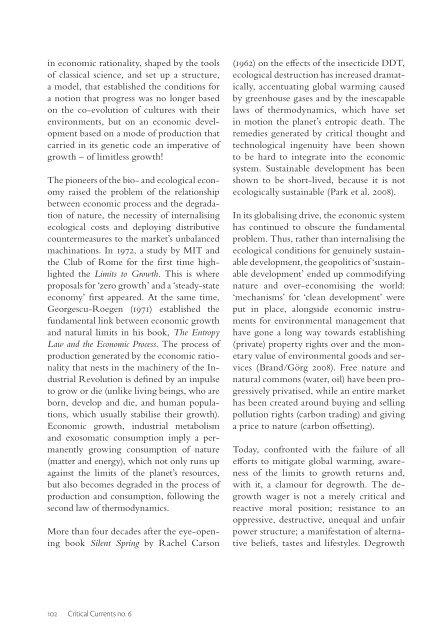Contours of Climate Justice - Dag Hammarskjöld Foundation
Contours of Climate Justice - Dag Hammarskjöld Foundation
Contours of Climate Justice - Dag Hammarskjöld Foundation
Create successful ePaper yourself
Turn your PDF publications into a flip-book with our unique Google optimized e-Paper software.
in economic rationality, shaped by the tools<br />
<strong>of</strong> classical science, and set up a structure,<br />
a model, that established the conditions for<br />
a notion that progress was no longer based<br />
on the co-evolution <strong>of</strong> cultures with their<br />
environments, but on an economic development<br />
based on a mode <strong>of</strong> production that<br />
carried in its genetic code an imperative <strong>of</strong><br />
growth – <strong>of</strong> limitless growth!<br />
The pioneers <strong>of</strong> the bio- and ecological economy<br />
raised the problem <strong>of</strong> the relationship<br />
between economic process and the degradation<br />
<strong>of</strong> nature, the necessity <strong>of</strong> internalising<br />
ecological costs and deploying distributive<br />
countermeasures to the market’s unbalanced<br />
machinations. In 1972, a study by MIT and<br />
the Club <strong>of</strong> Rome for the fi rst time highlighted<br />
the Limits to Growth. This is where<br />
proposals for ‘zero growth’ and a ‘steady-state<br />
economy’ fi rst appeared. At the same time,<br />
Georgescu-Roegen (1971) established the<br />
fundamental link between economic growth<br />
and natural limits in his book, The Entropy<br />
Law and the Economic Process. The process <strong>of</strong><br />
production generated by the economic rationality<br />
that nests in the machinery <strong>of</strong> the Industrial<br />
Revolution is defi ned by an impulse<br />
to grow or die (unlike living beings, who are<br />
born, develop and die, and human populations,<br />
which usually stabilise their growth).<br />
Economic growth, industrial metabolism<br />
and exosomatic consumption imply a permanently<br />
growing consumption <strong>of</strong> nature<br />
(matter and energy), which not only runs up<br />
against the limits <strong>of</strong> the planet’s resources,<br />
but also becomes degraded in the process <strong>of</strong><br />
production and consumption, following the<br />
second law <strong>of</strong> thermodynamics.<br />
More than four decades after the eye-opening<br />
book Silent Spring by Rachel Carson<br />
102 Critical Currents no. 6<br />
(1962) on the eff ects <strong>of</strong> the insecticide DDT,<br />
ecological destruction has increased dramatically,<br />
accentuating global warming caused<br />
by greenhouse gases and by the inescapable<br />
laws <strong>of</strong> thermodynamics, which have set<br />
in motion the planet’s entropic death. The<br />
remedies generated by critical thought and<br />
technological ingenuity have been shown<br />
to be hard to integrate into the economic<br />
system. Sustainable development has been<br />
shown to be short-lived, because it is not<br />
ecologically sustainable (Park et al. 2008).<br />
In its globalising drive, the economic system<br />
has continued to obscure the fundamental<br />
problem. Thus, rather than internalising the<br />
ecological conditions for genuinely sustainable<br />
development, the geopolitics <strong>of</strong> ‘sustainable<br />
development’ ended up commodifying<br />
nature and over-economising the world:<br />
‘mechanisms’ for ‘clean development’ were<br />
put in place, alongside economic instruments<br />
for environmental management that<br />
have gone a long way towards establishing<br />
(private) property rights over and the monetary<br />
value <strong>of</strong> environmental goods and services<br />
(Brand/Görg 2008). Free nature and<br />
natural commons (water, oil) have been progressively<br />
privatised, while an entire market<br />
has been created around buying and selling<br />
pollution rights (carbon trading) and giving<br />
a price to nature (carbon <strong>of</strong>f setting).<br />
Today, confronted with the failure <strong>of</strong> all<br />
eff orts to mitigate global warming, awareness<br />
<strong>of</strong> the limits to growth returns and,<br />
with it, a clamour for degrowth. The degrowth<br />
wager is not a merely critical and<br />
reactive moral position; resistance to an<br />
oppressive, destructive, unequal and unfair<br />
power structure; a manifestation <strong>of</strong> alternative<br />
beliefs, tastes and lifestyles. Degrowth
















